Faculty Mentors and Research Descriptions
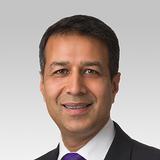
Hasan B Alam
Professor, Surgery (Trauma and Critical Care), Cell and Developmental Biology
Research Type
- Basic Science
- Translational
Research Interests
Hemorrhage, shock, sepsis, traumatic brain injury, novel treatments
Extended Description of Research
Injuries are the leading cause of death among young people. In fact, more young Americans die of injuries than all other causes combined. My research focuses on improving outcomes following lethal insults by focusing on hemorrhagic shock, traumatic brain injuries, resuscitation techniques, novel cell preservation strategies, modulation of response to lethal insults, therapeutic hypothermia, hemorrhage control, and development of new treatments for sepsis. This research is funded by large federal grants from the National Institutes of Health as well as by the US Department of Defense. My lab has published over 300 papers and submitted more than a dozen patents. Residents/students in the lab routinely publish over 20 papers resulting from their research time, and have won numerous awards, grants, and scholarships.
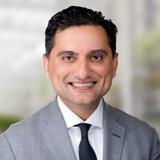
Murad Alam
Professor, Dermatology (Cutaneous and Aesthetic Surgery), Medical Social Sciences (Outcome and Measurement Science), Otolaryngology - Head and Neck Surgery, Surgery (Organ Transplantation)
Research Type
- Clinical/HSOR
- Global Health
- Consensus and guidelines
Research Interests
Rare skin cancers, developing clinical practice guidelines, qualitative research on surgery under local anesthesia, clinical outcomes after Mohs surgery and minimally invasive cosmetic procedures, core outcome set development
Extended Description of Research
I perform outcomes research on skin cancer and minimally invasive/noninvasive cosmetic procedures. Methods include randomized control trials, multicenter cohort studies, retrospective studies, qualitative research and thematic analysis, core outcome set and guidelines development, and production of appropriate use criteria.
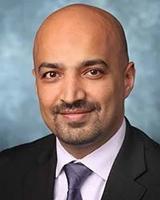
Amir M Alhajjat
Assistant Professor, Surgery (Pediatric General Surgery), Pediatrics
Dr. Alhajjat's Faculty Profile
Research Type
- Basic Science
- Translational
Research Interests
Fetal immunology, fetal infections
Extended Description of Research
My lab studies fetal immunology and development. That includes how the fetal immune system reacts to exposure to infectious agents or hematopoietic transplants and whether this exposure leads to tolerance or rejection.

Carl Atkinson
Professor, Surgery
Dr. Atkinson's Faculty Profile
Research Type
- Basic Science
Research Interests
Transplantation, organ pretreatment strategies, complement biology, respiratory disease, industry collaboration
Extended Description of Research
The research in our laboratory is focused on complement biology and immunology, and the role that the immune system plays in organ transplantation and respiratory diseases. Our transplantation studies are focused on all aspects of transplantation spanning donor organ management, ischemia reperfusion injury, and graft rejection. We utilize state of the art immunological assays to define immunological mechanisms that contribute to graft injury so that we can develop novel pharmacotherapeutic interventions to improve graft outcomes. Respiratory studies focus on the upper airway, specifically chronic rhinosinusitis. As with our transplant studies, our goals are to understand how the immune system modulates disease so that we can develop innovative therapeutic interventions.
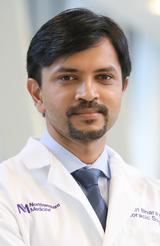
Ankit Bharat
Professor, Surgery (Thoracic Surgery), Medicine (Pulmonary and Critical Care)
Research Type
- Basic Science
Research Interests
Lung transplant, transplantation
Extended Description of Research
My research is focused on lung preservation, transplant immunology, and airway biology, achieved through collaboration with the Kovler Comprehensive Transplant Center and the Division of Pulmonary and Critical Care Medicine.
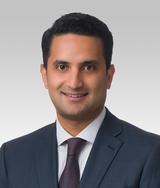
Anand Brahmandam
Assistant Professor, Surgery (Vascular Surgery)
Dr. Brahmandam's Faculty Profile
Research Type
- Education
- Translational
Research Interests
Device design, novel therapeutics, and advanced imaging for aortic disease and peripheral artery disease
Extended Description of Research
My research interests include device design, clinical outcomes in vascular surgery, surgical education/practice management and the application of novel therapeutic technology in vascular surgery, specifically aortic diseases and peripheral artery disease
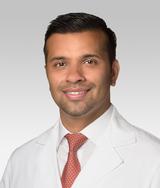
Akhil Chawla
Clinical Assistant Professor, Surgery (Surgical Oncology)
Research Type
- Clinical/HSOR
- Translational
Research Interests
Clinical trials, clinical outcomes, translational research
Extended Description of Research
I am actively involved in the design and implementation of clinical trials on an institutional and national level and am principal investigator of multiple oncology clinical trials within Northwestern Medicine and nationally. I am also involved in clinical outcomes research using large national datasets. I have a strong interest in translational laboratory research as director of the Northwestern Medicine Surgical Oncology Tumor Bank, Biorepository and Translational Research Laboratory in the West Region. My primary areas of focus include biomarker and response assessment of systemic therapies in gastrointestinal malignancies. For the purposes of research mentorship, my research effort is ideal for a dedicated trainee interested in learning to write clinical trials, with significant education and involvement in the field of clinical trial development and implementation. In addition, trainees are easily involved in clinical outcomes data projects and translational research in my lab.

Dina M Elaraj
Associate Professor, Surgery (Surgical Oncology)
Research Type
- Clinical/HSOR
Research Interests
Hyperaldosteronism, adrenal tumors, clinical outcomes, quality improvement
Extended Description of Research
I am currently working on several research projects involving patients with adrenal tumors and adrenal hormone excess. These include a prospective study examining hormone and radiographic outcomes of patients with incidental adrenal masses, outcomes of patients with hyperaldosteronism who have undergone adrenal vein sampling, and a quality improvement project involving screening patients with hypertension for hyperaldosteronism if they meet endocrine society clinical practice guidelines criteria to be screened.
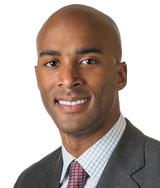
Marco Fredrick Ellis
Assistant Professor, Surgery (Plastic Surgery)
Research Type
- Clinical/HSOR
- Education
- Translational
Research Interests
Post-mastectomy pain syndrome, cranioplasty and scalp reconstruction, gender surgery outcomes, autologous breast reconstruction, neurotization
Extended Description of Research
My research interests include post-mastectomy pain syndrome (evaluating novel surgical techniques to reduce chronic pain, including nerve transfer and neural interfaces), cranioplasty and scalp reconstruction (examining collaborative approach to hostile scalp wounds, neuroplastic surgery), gender surgery outcomes (measuring patient reported outcomes in facial and gender surgery), autologous breast reconstruction (examining outcomes in breast re-sensitization after mastectomy), and neurotization.
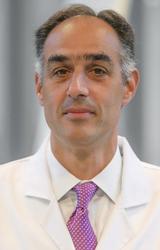
Mark K Eskandari
Professor, Surgery (Vascular Surgery), Medical Education, Radiology
Dr. Eskandari's Faculty Profile
Dr. Eskandari's Affiliated Website
Research Type
- Clinical/HSOR
Research Interests
Clinical outcomes, open and endovascular surgical care

Colin K Franz
Associate Professor, Physical Medicine and Rehabilitation, Neurology - Ken and Ruth Davee Department
Dr. Franz's Affiliated Website
Research Type
- Clinical/HSOR
- Translational
Research Interests
Nerve injuries, axon regeneration, precision medicine, ultrasound, neuromuscular medicine, induced pluripotent stem cells, neuroscience
Extended Description of Research
As a PM&R-physician and scientist with sub-specialty certifications in neuromuscular and electrodiagnostic medicine, the focus of my clinical and research agendas are highly integrated. I study as well as take care of patients with traumatic neurological injuries, neuropathy, diaphragm muscle weakness, and amyotrophic lateral sclerosis. My lab uses a combination of cellular, molecular, bioengineering and electrophysiological techniques and employs small animal (in vivo) and human stem cell-based (in vitro) models of nerve degeneration and regeneration. In addition, I conduct various clinically focused studies ranging from a neurotrauma patient registry to partnerships with biotechnology companies on nerve injury diagnostics and treatment modalities.

Robert D Galiano
Professor, Surgery (Plastic Surgery), Dermatology
Research Type
- Basic Science
- Clinical/HSOR
Research Interests
Optimizing wound healing, molecular patterns of scar recovery, improving facial and body aesthetics, tissue engineering, minimization of keloid scarring, assessing adverse effects from surgery, and ethnic differences in surgical outcomes
Extended Description of Research
My long-term research goals include understanding the mechanisms underlying impaired wound healing in humans, improving scarring in patients, and restorative surgery via tissue engineering approaches. My research has a heavy focus on skin biology. I have the privilege of approaching problems in wound healing, biofilm formation, scarring, and tissue engineering from both a clinical vantage as well as from a basic science perspective. I have also made a commitment to clinical translational research by laying the groundwork for a Clinical Trials Division in Plastic Surgery, with a variety of industry-sponsored and investigator-initiated clinical trials underway. My interests are to understand how we can integrate plastic surgery techniques and wound healing biology to engineer complex tissues and organs and how we can utilize novel technologies to enhance healing in chronic wound states, scarring in aesthetic patients, and optimize plastic surgery outcomes.
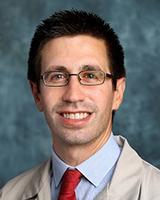
Seth D Goldstein
Associate Professor, Surgery (Pediatric General Surgery)
Dr. Goldstein's Faculty Profile
Research Type
- Clinical/HSOR
- Translational
Research Interests
Translational engineering research and pediatric surgical clinical outcomes
Extended Description of Research
My research endeavors leverage a background in engineering to develop translational technologies for both diagnostic devices as well as for surgeon visual field augmentation in the operating room. For example, I have an ongoing clinical trial of infrared spectroscopy as a diagnostic tool for necrotizing enterocolitis. Furthermore, I am working to develop fluorescent contrast agents and instruments that will interface with the infrared detection available on the newest generation of laparoscopic visualization systems.

Kathleen L Grady
Professor, Surgery (Cardiac Surgery), Medicine (Cardiology)
Research Type
- Clinical/HSOR
Research Interests
Heart failure, heart transplantation, ventricular assist devices, health-related quality of life, psychosocial outcomes, patient adherence, patient decision-making, caregiver burden, patient education, health literacy and palliative care
Extended Description of Research
My main interest is health-related quality of life of advanced heart failure patients who undergo heart transplantation or durable mechanical circulatory support as destination therapy (i.e., permanent) and their caregivers. I have two prospective, longitudinal, multi-site, NIH funded (NIA and NHLBI) R01 grants in this area of interest. I am also working with colleagues to submit an R01 grant application to NHLBI on a robust form of patient and caregiver education (simulation-based mastery learning) for patients after mechanical circulatory support implantation and their caregivers.

Karen J Ho
Associate Professor, Surgery (Vascular Surgery)
Research Type
- Basic Science
- Clinical/HSOR
Research Interests
Microbiome and vascular disease, peripheral arterial disease, vascular surgery, clinical outcomes after vascular surgery
Extended Description of Research
My research involves animal and cell-based models of arterial injury and remodeling; mechanisms of gut microbe regulation of arterial inflammation, restenosis and atherosclerosis; microbe-derived metabolomics in peripheral arterial disease (PAD), and gene and stem cell therapy for PAD. We welcome students and trainees from all levels of training.
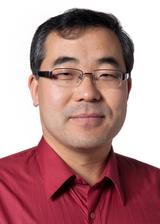
Seok Jong Hong
Research Associate Professor, Surgery (Plastic Surgery)
Research Type
- Basic Science
- Translational
Research Interests
Wound healing, hypertrophic scar, dermatitis, muscle regeneration
Extended Description of Research
I perform basic and translational research in cutaneous wound healing and use in vivo and in vitro models to understand the mechanisms of wound healing. Furthermore, I have developed a muscle-derived, decellularized extracellular matrix-based scaffold and isolated and characterized novel muscle progenitor cells that are highly proliferative but readily form mature muscle upon differentiation in vitro. I am investigating if these tools will promote regeneration of skeletal muscle.

Yue-Yung Hu
Associate Professor, Surgery (Pediatric General Surgery)
Research Type
- Clinical/HSOR
- Education
Research Interests
Resident well being, resident mistreatment, surgical education, pediatric surgery quality improvement, pediatric surgery institutional variation in care
Extended Description of Research
My research interests include the SECOND Trial, which is a cluster randomized controlled trial of 212 residency programs focused on well-being. The intervention is benchmarked program-specific data on resident well-being/learning environment + toolkit of program-level interventions. Data are both quantitative (ABSITE survey) and qualitative. Balancing measures include educational outcomes and patient outcomes. I am also the Surgeon Champion at Lurie. We're starting several QI projects including SSI reduction and antibiotic stewardship. I also dabble in some administrative data work (e.g., PHIS).

Eric S Hungness
Professor, Surgery (Gastrointestinal), Medical Education
Dr. Hungness's Faculty Profile
Research Type
- Clinical/HSOR
- Education
Research Interests
Foregut surgery outcomes, surgical education, esophageal physiology, laparoscopic common bile duct exploration simulation
Extended Description of Research
I have a longstanding clinical interest in minimally invasive foregut surgery, including bariatric surgery. I have one of the largest experiences in the world in Per-Oral Esophageal Myotomy (POEM) for the treatment of achalasia and esophageal motor disorders. Research related to these interests include clinical outcomes, esophageal physiology, and the use of novel devices (EndoFLIP) to improve surgical outcomes. I am also the surgical director of Northwestern Simulation, which is focused on the use of simulation-based mastery learning (SBML) in the acquisition of minimally invasive surgical skills, with an emphasis on laparoscopic common bile duct exploration. Research efforts around this his resulted in the development of a now commercially available novel simulator and an established SBML curriculum that has demonstrated improved clinical outcomes and cost savings.
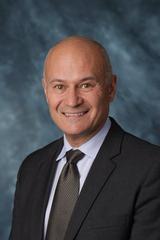
Thomas H Inge
Professor, Surgery (Pediatric General Surgery)
Research Type
- Clinical/HSOR
Research Interests
Pediatric obesity, bariatric surgery outcomes
Extended Description of Research
I am a surgeon and clinical researcher focused on understanding the outcomes of surgical interventions for pediatric severe obesity. My research goals are to better understand the long term consequences, both benefits and risks, of surgical treatment. I have a highly collaborative approach and my interests span the spectrum of health complications of obesity.
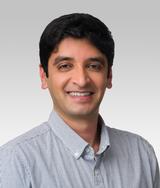
Dinesh Jaishankar
Research Assistant Professor, Surgery (Organ Transplantation)
Dr. Jaishankar's Faculty Profile
Dr. Jaishankar's Affiliated Website
Research Type
- Basic Science
- Translational
Research Interests
Solid organ transplantation, bioengineering, nanotherapeutics, donor organ pre-conditioning strategies, endothelial cell biology, immunometabolism
Extended Description of Research
The Comprehensive Transplant Immunobiology Laboratory (CTIL) is dedicated to investigating novel innovations in solid organ transplant research. Our research focus includes all aspects of transplantation spanning donor organ management to allograft tolerance induction. In addition, we are also investigating techniques that will lead to the next era of transplantation, including bioengineering and targeting cell-specific immunometabolism.

Bin Jiang
Assistant Professor, Surgery (Vascular Surgery)
Assistant Professor, McCormick School of Engineering
Dr. Jiang's Affiliated Website
Research Type
- Basic Science
- Translational
- Engineering
Research Interests
PAD, AAA, vascular calcification, diabetic vascular complications, COVID-19 induced vascular injuries
Extended Description of Research
We are a joint research program of vascular surgery and biomedical engineering, where a diverse group of engineers, scientists and clinicians work together with the common goal of serving patients with vascular diseases and training the next generation researchers. Our research interests include microvascular regeneration (using a combination of stem cell technology, advanced biomaterials design, and non-invasive cell tracking to engineer the regeneration of microvascular networks to attenuate local tissue ischemia), macrovascular engineering (engineering functional arteries as vascular replacements that are resistant to thrombosis, intimal hyperplasia, calcification and other degenerative changes), and novel disease models (engineering a variety of human disease models with patient-derived stem cells and animal surgeries to understand the mechanism of the disease and to develop effective therapeutic strategies).

Julie K Johnson
Adjunct Professor, Surgery (Surgical Oncology)
Dr. K. Johnson's Faculty Profile
Dr. K. Johnson's Affiliated Website
Research Type
- Clinical/HSOR
- Education
Research Interests
Clinical quality improvement, improvement science, implementation science, qualitative research methods, coproduction
Extended Description of Research
My research has focused on building a series of collaborative relationships to improve the quality and safety of health care through research, clinical improvement, and teaching. As a researcher, I use qualitative research methods to better understand processes of care and the effect of the care process on clinical teams, teamwork, and patients and families. I have had the opportunity to live and work in three countries (the United States, the Netherlands, and Australia). This has given me a unique perspective on international health systems, in addition to building a strong network of international research colleagues and ongoing opportunities. More recently, my research has focused on coproduction, understanding processes of care from the patient and family perspective, and designing and improving healthcare services in partnership with people who receive the services. I am the Scientific Director of the Surgical Outcomes and Quality Improvement Center (SOQIC).

Sumanas W Jordan
Assistant Professor, Surgery (Plastic Surgery)
Research Type
- Basic Science
- Clinical/HSOR
Research Interests
Electroconductive scaffolds for nerve and muscle engineering, transgender health, gender affirming surgery, lymphedema surgery
Extended Description of Research
My lab takes inspiration from difficult problems encountered in plastic surgery, specifically peripheral nerve regeneration and denervation injury, lymphedema, and vascularized composite allotransplantation. The overarching theme of the lab is electroconductive biomaterial design for regeneration and disease state modeling. Neurons and myocytes are classic examples of electroactive cells that respond to electrical fields and stimulation. Graphene scaffolds exhibit biocompatibility and conductivity that may be used for in vivo and in vitro application. Our clinical research arm focuses on transgender health and quality. We have built a database of TGNB patients using EMR techniques to study health disparities among TGNB individuals. Separately, we have a prospective database of TGNB individuals presenting for gender affirming care to study care delivery and quality.
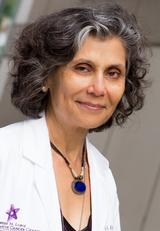
Seema A Khan
Professor, Surgery (Breast Surgery)
Research Type
- Basic Science
- Clinical/HSOR
Research Interests
Breast cancer, cancer prevention
Extended Description of Research
My research aims to understand breast cancer risk and find safe ways of preventing breast cancer.
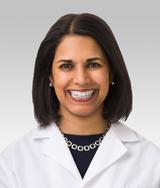
Swati Kulkarni
Professor, Surgery (Breast Surgery)
Dr. Kulkarni's Faculty Profile
Research Type
- Clinical/HSOR
- Translational
Research Interests
Breast cancer, breast cancer prevention, clinical trials
Extended Description of Research
My primary focus is on prevention and treatment of ER+ breast cancers. My focus is on developing and conducting translational clinical trials in conjunction with basic scientists. I also have an interest in ergonomics. I currently mentor the general surgery residents on their QI project.

Daniela P Ladner
Professor, Surgery (Organ Transplantation), Medical Social Sciences (Determinants of Health)
Dr. Ladner's Affiliated Website
Research Type
- Clinical/HSOR
Research Interests
Liver disease, kidney disease and transplantation
Extended Description of Research
I mentor mentees who are interested in liver disease. We use large data for epidemiological research and have ongoing investigations to study frailty, sarcopenia, literacy, quality of life, neurological decline and more. We offers hands-on experience in a large outcomes research lab that includes medical students, residents, fellows and junior faculty. This allows for a lot of collaboration and daily support, but each mentee has his/her own main research focus. This experience includes learning all about outcomes research and translates easily to other specialties in the future. Hence, anybody interested in doing state-of-the art outcomes research is welcome. For those few who are super serious and already know that they want to become a clinician scientist in the future in either hepatobiliary surgery or transplant, I am the PI of a Transplant T32 that provides funding for 2-3 years.
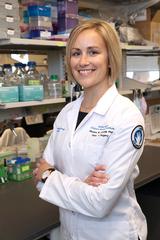
Monica M Laronda
Assistant Professor, Pediatrics (Endocrinology), Obstetrics and Gynecology
Dr. Laronda's Affiliated Website
Research Type
- Basic Science
- Translational
Research Interests
Fertility and hormone preservation and restoration
Extended Description of Research
My lab performs basic and translational research and is part of the Fertility & Hormone Preservation & Restoration team, directed by Dr. Erin Rowell (Pediatric Surgeon). We aim to improve the current fertility preservation options for patients that are at high risk for developing premature ovarian insufficiency as a result of their disease or treatment or those with dysgenic gonads. We develop immediate, next and future technologies and techniques that will maximize the fertility potential and restore ovarian hormone function. Current advancements include defining the optimal surgical techniques to procure ovarian tissue while maintaining ovarian follicle health for cryopreservation, defining improved processing procedures for pediatric ovarian and gonadal tissue cryopreservation, engineering a safe bioprosthetic ovary that would support long-term fertility and hormone function for those with metastatic disease, and exploring stem cell technologies to restore hormone function.

Joseph R Leventhal
Professor, Surgery (Organ Transplantation)
Dr. Leventhal's Faculty Profile
Research Type
- Basic Science
- Clinical/HSOR
- Translational
Research Interests
Transplant tolerance, biomarkers, xenotransplantation
Extended Description of Research
I am a surgeon scientist with a focus on solid organ transplantation. I have been actively involved in basic science, translational, and clinical research for almost 30 years. My research career began with NIH funded research in xenotransplantation, studying the mechanisms of hyperacute rejection in preclinical rodent and nonhuman primate models. I have conducted research for the past 15+ years on the use of cell-based therapies for the induction of tolerance in solid organ transplantation. I have served as a lead investigator on an NIH and DOD funded Phase 2 clinical trial of tolerance induction through establishment of chimerism using combined engineered donor stem cell (FCRx) and kidney transplantation in mismatched and unrelated donor/recipient pairs. In addition, I am the PI of a DOD-sponsored grant to further study tolerance in kidney recipients.
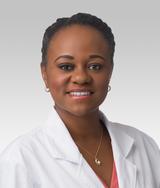
Juliet S Lumati
Assistant Professor, Surgery (Surgical Oncology)
Research Type
- Global Health
Research Interests
Healthcare financing , financial toxicity
Extended Description of Research
I am a health services researcher within the context of global oncology. My research centers on interventions to reduce the risk of financial toxicity for cancer patients in Sub-Saharan Africa and Nigeria in particular. We have an existing partnership with the first comprehensive cancer center in Nigeria which houses a cancer registry of over 1000 patients. My long term plan is to implement interventions through patient navigation to reduce barriers to care
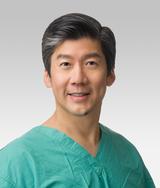
S Chris Malaisrie
Professor, Surgery (Cardiac Surgery)
Dr. Malaisrie's Faculty Profile
Research Type
- Clinical/HSOR
- Translational
Research Interests
Atrial fibrillation, Thoracic aortic disease, Bicuspid aortic valve, Mitral regurgitation, Pulmonary hypertension
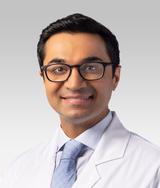
Neel A Mansukhani
Assistant Professor, Surgery (Vascular Surgery)
Dr. Mansukhani's Faculty Profile
Research Type
- Clinical/HSOR
- Translational
Research Interests
Aortic diseases, peripheral vascular disease, quality improvement, enhanced recovery, healthcare disparities
Extended Description of Research
I am interested in aortic diseases and peripheral vascular disease; improving healthcare delivery, efficiency, and value; exploring and addressing sex/gender/racial disparities and implicit biases in vascular surgery; enhanced recovery after surgery; quality improvement
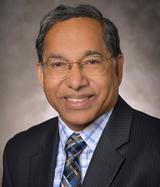
James M Mathew
Research Professor, Surgery (Organ Transplantation), Microbiology-Immunology
Dr. Mathew's Affiliated Website
Research Type
- Basic Science
- Translational
Research Interests
Transplantation, clinical trial methodology, immune regulation, immunology, stem cells, translational research, liver diseases, viral diseases
Extended Description of Research
My research for the past 28 years has been in the areas of immune responsiveness and tolerance induction in clinical organ transplantation. The major thrust has been on the immunological effects of donor hematopoietic stem cell (DHSC) infusions in organ transplant patients using in vitro and ex vivo culture systems. Another emphasis has been to develop biomarker assays to identify potentially tolerant recipients who may be candidates for immunosuppressive drug withdrawal/minimization. Recent studies have also assessed the role of CD4+CD127-CD25HighFoxP3+ regulatory T cells (Tregs) as potential tolerance inducers in transplant patients, as well as the differential susceptibility of Tregs to currently used immunosuppressive drugs. A major current focus is on the use of autologous expanded Tregs for tolerance induction as well as to develop technology to deliver those Tregs to the sites where they are needed for immune modulation. Other tolerance inducing mechanisms are also being actively investigated.

Melissa G Medina
Assistant Professor, Surgery (Cardiac Surgery)
Research Type
- Clinical/HSOR
- Education
- Global Health
Research Interests
Resident education, heart transplantation, aortic pathology
Extended Description of Research
I am interested in skills simulation and translatability to the operative setting and in expanding the donor pool in heart transplantation

Nicole A Meredyth
Assistant Professor, Surgery (Trauma and Critical Care)
Dr. Meredyth's Faculty Profile
Research Type
- Clinical/HSOR
- Education
- Normative, Descriptive
Research Interests
Trauma and emergency general surgery, surgical ethics, ethics education, surgical education, simulation education
Extended Description of Research
My interests pertain to ethical issues that arise in surgical practice, such as treatment over objection for patient's with limited or lacking capacity, issues pertaining to perceived non-beneficial treatment (specifically those in surgical fields), communication with patient's and families surrounding end-of-life issues, etc. I also have an interest in surgical education, including technical and non-technical skills, clinical ethics education (targeting surgical residents and fellows), and simulation education.
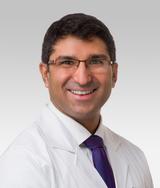
Satish N Nadig
Professor, Surgery (Organ Transplantation), Microbiology-Immunology, Pediatrics
Dr. Nadig's Affiliated Website
Research Type
- Basic Science
- Translational
Research Interests
Transplant tolerance, organ pretreatment strategies, industry collaboration, immunometabolism, nanotherapy
Extended Description of Research
The research focus of the Comprehensive Transplant Immunobiology Laboratory is dedicated to investigating novel innovations in transplant research. As a comprehensive research enterprise, we are interested in all aspects of transplantation spanning donor organ management to the induction of allograft tolerance. In addition, we are also investigating techniques that will lead to the next era of transplantation including bioengineering and nanotherapy. Additionally, the CTIL is a comprehensive federally and privately funded institute that also engages the Matthews Center for Cellular Therapy and Private Industry for all aspects of transition of therapeutics to patient care.

Vitaliy Y Poylin
Associate Professor, Surgery (Gastrointestinal)
Research Type
- Clinical/HSOR
- Global Health
Research Interests
Inflammatory bowel disease (IBD), improvement in perioperative care, optimization of OR processes
Extended Description of Research
My interests include perioperative optimization and improvement in outcomes of colon and rectal patients, in particular patients with IBD. Current projects include pitfalls and interruptions in robotic surgery, effect of NSAIDs on patients with IBD, defining IBD flare in mega data, Lynch patients, and decrease in infectious complications in Ukraine

Mehul V Raval
Professor, Surgery (Pediatric General Surgery), Pediatrics
Dr. Raval's Affiliated Website
Research Type
- Clinical/HSOR
Research Interests
Improving quality, safety, and value for children undergoing surgery
Extended Description of Research
As a physician scientist, my research portfolio includes projects focused on quality improvement, patient safety, and value-based care predominantly for children undergoing surgery. I have an established record of successful mentorship with several mentees matching into pediatric surgery and other competitive fields. I played a key role in the establishment of the ACS National Surgical Quality Improvement Program - Pediatric (NSQIP-P) which is now in place at more than 150 hospitals. I am currently funded with an R01 grant from the Agency of Healthcare Research and Quality to research the added value of surgical procedures performed in a children's hospital compared to non-children's hospitals. I am also funded with an R01 from the NIH/NICHD to study the implementation of enhanced recovery protocols for children undergoing surgery (www.enrich-us.org).

Heron E Rodriguez
Professor, Surgery (Vascular Surgery), Radiology
Dr. Rodriguez's Faculty Profile
Dr. Rodriguez's Affiliated Website
Research Type
- Clinical/HSOR
- Education
Research Interests
Clinical outcomes after lower extremity revascularization, abdominal aortic aneurysm repair, venous and arterial surgery
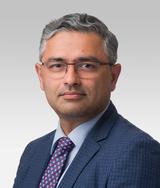
Vinayak S Rohan
Associate Professor, Surgery (Organ Transplantation)
Research Type
- Clinical/HSOR
Research Interests
Outcomes research, quality improvement
Extended Description of Research
My research is focused on clinical outcome research and quality outcomes. Ongoing projects include improving the long term outcomes of kidney transplant recipients, opioid minimization on transplant recipients and hepatocellular carcinoma (HCC) surveillance.

Erin Rowell
Professor, Surgery (Pediatric General Surgery)
Dr. Rowell's Affiliated Website
Research Type
- Basic Science
- Clinical/HSOR
- Translational
Research Interests
Pediatric fertility preservation, pediatric ovarian biology
Extended Description of Research
Together with my research partner, Monica Laronda, PhD, I direct the pediatric Fertility and Hormone Preservation and Restoration program at Lurie Children's. We study optimal surgical techniques for ovarian tissue removal for cryopreservation using a piglet model and pediatric laparoscopic equipment. We also study pediatric ovary tissue processing techniques in preparation for long term tissue cryopreservation. We have a variety of clinical projects in pediatric fertility preservation related to long term outcomes and video-based education for fertility preservation. The goal of our work is to improve the quality of pediatric ovarian tissue cryopreservation from tissue removal to processing to future restoration of fertility and hormone function. A research fellow in our program will also have the opportunity to learn how to perform clinical consultation for fertility preservation and surgical procedures for pediatric ovarian and testicular cryopreservation by assisting in the OR for all cases.
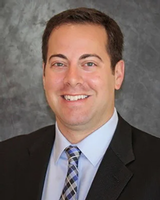
Justin R Ryder
Associate Professor, Surgery (Pediatric General Surgery), Pediatrics
Dr. Ryder's Affiliated Website
Research Type
- Basic Science
- Clinical/HSOR
- Translational
Research Interests
Pediatric obesity treatment
Extended Description of Research
I am a clinical translational pediatric obesity researcher focused on understanding the biology underlying treatment response for pediatric obesity. The goal of my NIH funded research is to expediate the translation of treatment from adults to children for obesity and improve short-term and long-term outcomes for youth with obesity. My highly collaborative works span the continuum of treatment with studies focused on lifestyle modification, medications, and surgery. I also serve as the Vice Chair of Research for the Department of Surgery at Lurie Children’s Hospital.
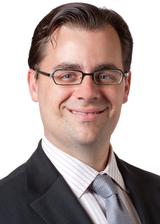
Steven J Schwulst
Associate Professor, Surgery (Trauma and Critical Care)
Dr. Schwulst's Faculty Profile
Dr. Schwulst's Affiliated Website
Research Type
- Basic Science
Research Interests
Traumatic brain injury, microglia, molecular biology, immunology, computational biology, neuroscience, gut microbiome
Extended Description of Research
My laboratory unites my clinical interest in traumatic brain injury (TBI) with my basic science interest in post-injury immune dysfunction. To date, my research has centered on four facets of TBI: 1) the role of the post-injury gut microbial community structure in neurocognitive outcomes after TBI, 2) the role of constitutive microglial activation in the etiology and evolution of chronic neurodegeneration after TBI, 3) identifying common molecular pathways between TBI and neuropsychiatric disease, and 4) the development of a ferret model of chronic traumatic encephalopathy that more closely recapitulates the human disease process than do standard rodent models. My research is funded by the NIH and Department of Defense.
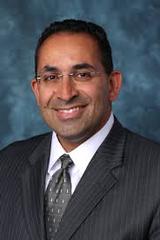
Aimen F Shaaban
Professor, Surgery (Pediatric General Surgery), Pediatrics
Research Type
- Basic Science
- Clinical/HSOR
- Translational
Research Interests
Fetal surgery
Extended Description of Research
Our basic science laboratory group studies mechanisms of immune education and tolerance during fetal development. Our translational research program explores technological innovations in fetal surgery.

Arun Sharma
Research Associate Professor, Urology (Pediatric Urology)
Dr. Sharma's Affiliated Website
Research Type
- Basic Science
- Translational
Research Interests
The implementation of regenerative engineering principles to improve translational outcomes for a wide array of patient populations afflicted with debilitating disease.
Extended Description of Research
The Sharma Research Group focuses on tissue engineering and biomaterials in urologic, gastrointestinal, and vascular regeneration models. We study the regenerative applications of combining novel biocompatible polymerics with specific stem and progenitor cell populations. These populations are investigated in conjunction with scaffold modifications to design tissue grafts with enhanced functionality. Projects include implementation of small molecules, extracellular vesicles, and nanomolecules to customize microenvironments. Specifically, the implementation of small molecules to influence cell fate, and the fabrication of novel pro-regenerative/anti-inflammatory nanomolecule/scaffold hybrids to aid in the regenerative process and combat specific disease types. One example of the patient-specific applications of the Sharma Group’s research scope is validating the efficacy of potent nanomolecules to combat protracted inflammation in disease conditions including Crohn's disease (CD) and ulcerative colitis (UC). Sharma is Director of Pediatric Urological Regenerative Medicine at Ann & Robert H. Lurie Children’s Hospital of Chicago and Director of Surgical Research at Stanley Manne Children’s Research Institute.
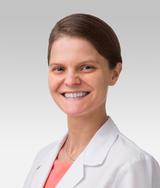
Anne M Stey
Assistant Professor, Surgery (Trauma and Critical Care)
Research Type
- Clinical/HSOR
Research Interests
Trauma systems, victim services, non-technical skills
Extended Description of Research
I am interested in developing trauma systems to improve timeliness of care of critically injured patients, measuring outcomes of victim services programs, and quantifying non-technical skills impact on team performance and wellness

Riccardo A Superina
Professor, Surgery (Pediatric Transplant Surgery)
Dr. Superina's Faculty Profile
Research Type
- Clinical/HSOR
Research Interests
Portal hypertension in children, biliary atresia, congenital portosystemic shunts, results of treatment of liver tumors in children
Extended Description of Research
My research group focuses on outcomes in children with portal hypertension, intrinsic liver disease such as biliary atresia, and liver tumors such as hepatoblastoma. We also have published on outcomes after liver transplantation in children. We are also focused on quantifying minimal encephalopathy in children with portal vein thrombosis before and after surgical correction of deficiencies in portal blood flow to the liver.

Anat Roitberg-Tambur
Research Professor, Surgery (Organ Transplantation)
Dr. Tambur's Affiliated Website
Research Type
- Translational
Research Interests
Transplant immunology
Extended Description of Research
My research focuses on understanding the immunogenicity of HLA-DQ antigens and their role in antibody-mediated rejection in solid organ transplantation. Increasing evidence has demonstrated that DQ mismatches between transplant recipient and donor are the most common to induce de novo donor-specific antibodies (DSA). HLA-DQ antibodies are likely also the most detrimental to graft survival. Understanding the unique structural and molecular properties that make the HLA-DQ molecule so pathogenic will help in better predicting which mismatches will induce harmful antibody formation, and which are more permissible. This information will promote better informed clinical decision-making.

Leah Carey Tatebe
Associate Professor, Surgery (Trauma and Critical Care)
Research Type
- Clinical/HSOR
- Education
- Translational
Research Interests
Injury prevention, pre-hospital trauma care, trauma resuscitation, resident autonomy
Extended Description of Research
My research interests are wide-ranging and include firearm injury prevention, trauma-informed care, social determinants of health, medical ethics, pre-hospital airway management, traumatic brain injury, hemorrhage control, tourniquet use, resident career development, and resident autonomy.
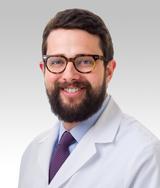
Ezra N Teitelbaum
Associate Professor, Surgery (Gastrointestinal)
Dr. Teitelbaum's Faculty Profile
Research Type
- Clinical/HSOR
- Education
Research Interests
Outcomes, Surgeon decision-making, Physiology of foregut and bariatric surgery, Surgical video review, AI for education and outcomes prediction, Simulator-based surgical education
Extended Description of Research
As a member of the NQUIRES group, I have mentored residents on projects evaluating outcomes, surgeon decision-making, physiology, and access to care, primarily related to foregut and bariatric surgery. Previously, I have partnered with esophageal GI to study the physiology and outcomes of surgery and endoscopic interventions for achalasia, hiatal hernia, and GERD, including the intraoperative use of a novel measurement device, EndoFLIP. Another area of research is related to a simulator-based curriculum which we developed to teach laparoscopic common bile duct exploration. I am the Northwestern physician lead for the Artisite Procedural Video Archive, which records all MIS surgeries performed at Northwestern. This is a huge potential resource for research related to surgical education and AI.
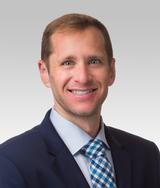
Chad M Teven
Clinical Assistant Professor, Surgery (Plastic Surgery)
Research Type
- Clinical/HSOR
- Education
- Translational
Research Interests
Health Economics, Medical Ethics, Innovation
Extended Description of Research
Clinical and patient-reported outcomes after breast reconstruction and lymphedema, medical and surgical ethics (bioethics), health economics, artificial intelligence, surgical innovation, health policy, global health and surgery, medical Education

Yao Tian
Research Assistant Professor, Surgery (Surgical Oncology)
Research Type
- Clinical/HSOR
Research Interests
Quality of care, clinical outcomes, quantitative research
Extended Description of Research
My research interests include measuring quality of care, assessing outcomes, and evaluating costs using clinical and claims data. By leveraging quantitative research methods, my research provides empirical evidence for program implementation and policy decisions.
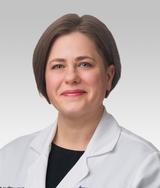
Ashley K Vavra
Associate Professor, Surgery (Vascular Surgery)
Dr. Vavra's Affiliated Website
Research Type
- Clinical/HSOR
- Education
Research Interests
Quality improvement
Extended Description of Research
I do clinical outcomes research to determine drivers that can be targets for process or quality improvement projects. My research interests also expand to training and education for providers in quality improvement methodology, leadership and team building.
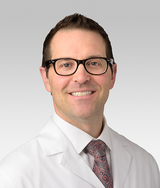
Gabriel A Wallace
Clinical Assistant Professor, Surgery (Vascular Surgery)
Research Type
- Clinical/HSOR
- Education
Research Interests
Clinical outcomes, open and endovascular surgical care, non-ionizing imaging modalities
Extended Description of Research
Carotid artery and aortoiliac interventions, intravascular ultrasound, forward looking infrared, surgical technique
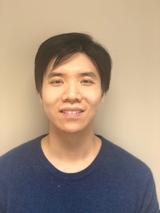
Bowen Wang
Assistant Professor, Surgery
Research Type
- Basic Science
- Translational
Research Interests
Understanding of and innovative therapies for peripheral vascular disease
Extended Description of Research
My group focuses on mechanistic and translational research in peripheral vascular diseases, including restenosis, aneurysm, and thrombosis. We specialize in combining nanomedicine, cellular/molecular biology, gut microbiome, and experimental animal models to achieve better understanding of and innovative therapies for peripheral vascular diseases
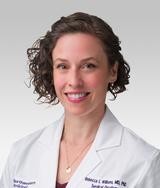
Rebecca L Williams
Assistant Professor, Surgery (Surgical Oncology)
Dr. Williams's Faculty Profile
Research Type
- Clinical/HSOR
- Education
Research Interests
Surgical education, surgical learning environment, psychological safety, motivation, entrustable professional activities, curriculum development
Extended Description of Research
My research focus is in surgical education, with a specific interest in the surgical learning environment. Within this domain I have focused on understanding the role of psychological safety in mediating learner motivation. I am interested in faculty development and development of curricular interventions that facilitate engagement in teaching. I am also interested understanding how implementation science can be leveraged to change behaviors of teachers and learners.

David S Winlaw
Professor, Surgery (Pediatric Cardiovascular-Thoracic Surgery), Pediatrics (Cardiology)
Research Type
- Clinical/HSOR
- Translational
Research Interests
Outcomes after heart surgery for congenital heart disease, development of a novel valved RV-PA connection, neurodevelopment in the context of congenital heart disease
Extended Description of Research
As a cardiac surgeon specializing in congenital and childhood conditions, my research targets the areas of clinical need. These include: 1) Targeted research to understand the long-term impacts of our interventions, particularly in the single ventricle population as well as other neonatal and infant interventions, including the Ross-Konno procedure. 2) I am the translational lead on a project to develop a novel valved conduit to improve available options for children and adults who need a right ventricle to pulmonary artery connection as part of their repair. This project involves material science, in vivo studies and computational fluid assessments. 3) The cause of neurodevelopmental problems in children with congenital heart disease is not fully understood. Genetic factors are not well accounted for and are the focus of investigation in novel stem-cell based models.